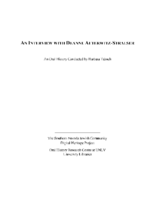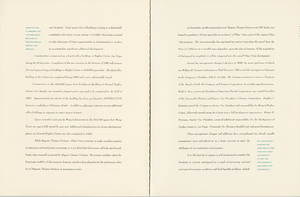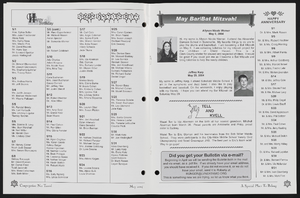Search the Special Collections and Archives Portal
Search Results

Meeting minutes for Consolidated Student Senate University of Nevada, Las Vegas, March 27, 1984
Date
Archival Collection
Description
Text

Transcript of interview with Mike, Fred, & John Pinjuv by Barbara Tabach, May 13, 2014
Date
Archival Collection
Description
Mike Pinjuv sired one of Las Vegas’s early families after arriving in 1917. Mike Pinjuv arrived in Las Vegas via the Union Pacific Railroad and brought Ivan Pinjuv and his family to town (although Mike’s sons do not know the familial relation between the two men). Mike and his wife, Frances Malner, raised six sons and two daughters to adulthood through World War 1, the Great Depression, and World War II. The oldest five brothers attended Las Vegas High School, while Fred, the youngest brother, and the two sisters attended Rancho High School. In this interview, their three younger sons recall how they, their parents, and their siblings navigated the social and physical changes in the Las Vegas landscape. Over the near century that the Pinjuv family has lived in Las Vegas its members have contributed to the city in countless ways. In the early years Mike owned a gas station and a grocery store and worked several jobs before going to Nellis Air Force Base as a civilian. Of the Pinjuv sons
Text

Transcript of interview with Ann Clark Kanie by Lois Goodall, March 20, 2014
Date
Archival Collection
Description
Born and raised in Las Vegas, Ann Clark Kanie, elementary teacher, exemplifies the love of teaching in Clark County. Her mother, Marie Larson Clark Dane, taught elementary school at Lincoln Elementary School for 35 years. Ann attended Lincoln Elementary with her mother, Jim Bridger Junior High, Rancho, and then graduated from UNLV in elementary education. She also began teaching, like her mother, at Lincoln Elementary in North Las Vegas but later changed to Wasden Elementary which she obviously admires. Ann recalls growing up in Las Vegas and the fun that she and her friends enjoyed: participating in Helldorado Week, renting horses at Tule Springs or Old Nevada, riding bikes to the Meadows Mall and the Black Hole at the Springs Preserve, sliding down Becker’s Super Slide on Decatur Avenue, watching Disney movies at the Huntridge Theater, playing miniature golf and ice skating at Commercial Center, and going to Lake Mead and investigating the Potosi Mines. Ann married, continued teaching at Wasden. Her only son has chosen to follow his mother’s footsteps, graduated from UNLV in English education and teaches and coaches at Cimarron-Memorial High School. Even though she admits that teaching has become a very difficult, time-consuming job, it is obvious that Ann Kanie loves educating students and has passed this love on to her son.
Text

Transcript of interview with Lori Chenin-Frankl by Barbara Tabach, June 7, 2016
Date
Archival Collection
Description
Lori provides a wonderful narrative of her Judaism, her love of teaching children and her devotion to family and music. She talks about growing up in Las Vegas and becoming a bat mitzvah, a rarity for girls in 1973. Throughout her life, including the period where she moved around with her Air Force husband, she sought Jewish connections to help her feel at home no matter where she was.
Text

Transcript of interview with Adele Baratz by Claytee D. White, March 19, 2007
Date
Archival Collection
Description
Interview with Adele Baratz by Claytee White on March 19, 2007. In this interview, Baratz talks about her parents who came to the United States as teenagers from Russia and eventually settled in Las Vegas after a short time in California. She discusses the Jewish community in Las Vegas when she was growing up, and her father's job selling bootlegging supplies, then as a real estate broker, then as a bar owner. Baratz attended the Fifth Street Grammar School, which was built after a fire destroyed the original school, and Las Vegas High School. As a teenager, she worked at Nellis as a messenger and in the rations department, then went to nursing school in Baltimore at Sinai Hospital. She talks about her father's bar, "Al's Bar," that was popular with Union Pacific Railroad workers, and how the bar was forced out for the building of the Golden Nugget. Baratz recounts where her family lived, the growth of the Jewish community, and building the first synagogue on Carson Street.
Text

Transcript of interview with Deanne Alterwitz-Stralser by Barbara Tabach, November 1, 2014
Date
Archival Collection
Description
Interview with Deanne Alterwitz-Stralser with contributions from her son Daryl Alterwitz on November 1, 2014. In this interview Deanne talks about her Jewish upbringing near the Illinois-Indiana state line, meeting her first husband Oscar, with whom she had four children, and the difficulties with keeping kosher. The family moved to Las Vegas from Gary, Indiana for opportunities in the furniture business. Daryl weighs in on his father's personality, business decisions, and their move to Las Vegas. They discuss the location of the store the Alterwitz's bought (Walker Furniture) and purchasing the building from Jackie Gaughan, and the different tastes in furniture in Las Vegas. Then they talk about the Jewish community and the division between the east and west sides.
On New Year's Day, 1931, Deanne Alterwitz-Stralser was born Deanne Friedman in Hammond, Indiana, the daughter of an insurance salesman and a stay-at-home mom. Deanne spent her childhood in Calumet City, just across the state line in Illinois, and was raised with a strong Jewish identity. At the age of sixteen, she met her first husband, Oscar Alterwitz, at an Alpha Zadik Alpha (AZA) dance in Gary, Indiana, and the two were married in 1950. Deanne and Oscar settled in Gary, where they had four children?Aimee, Larry, Daryl and Linda?and took over the Alterwitz family furniture business. Eventually, the couple grew the business to three successful retail furniture stores. However, a decline in the city's safety and opportunities forced the Alterwitz's to consider relocating, and in 1973, after a family vote, Deanne and Oscar moved their family to Las Vegas. Upon arrival, Deanne and Oscar bought Walker Furniture from original owners, George and Ruth Walker. Deanne used her artistic eye and training from the Art Institute of Chicago to lead the design and merchandising elements of the business. Socially, Deanne integrated into the local Jewish community, and ensured her children participated in Jewish life as well. Deanne and Oscar's children still remained involved in Walker Furniture operations, including Daryl, who serves as the company's general counsel; Larry, who is the company's president; and a daughter who now oversees the store's design and merchandising.
Text




